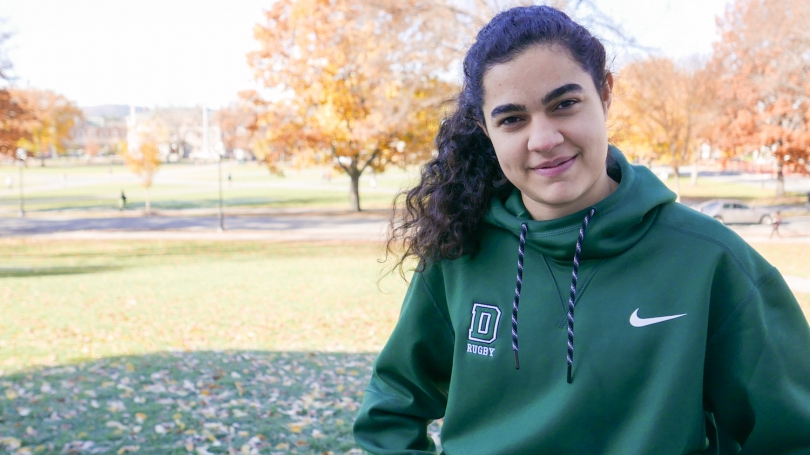
- About
- Consultation
- Programs
- Resources
- News & Events
Back to Top Nav
Back to Top Nav
Back to Top Nav
Saba Kaboly Nejad ’18 believes cancer can be cured.
A physics and computer science modified with math major, Nejad delved into physics research during her first year at Dartmouth. She believes that approaching cancer treatment from a physics perspective, outside of the traditional biological approach, can potentially bring new solutions and forms of treatment for the disease.
Nejad, from Waterloo, Ontario, is a recipient of the Dartmouth Stamps Scholar Award. She is in the early stages of conducting research for her Stamps project, titled, “Exploring Medical Physics—Finding a Cure for Cancer!.” Her project is primarily guided by Chandrasekhar Ramanathan, an assistant professor of physics and astronomy. Brian Pogue, professor of engineering science, and Timothy Smith, adjunct associate professor of physics and astronomy, are also her advisors, offering expertise in medical physics and particle physics.
Why does your project matter?
The point of the project is to see if physics can benefit the treatment of cancer. Can patients be diagnosed earlier? Currently, treatments X, Y, and Z are used in combination even though they have side effects. Looking at why those treatments work, why people keep using them in light of certain outcomes, and why they continue to be the best options can help make the next best thing.
What has your research entailed thus far?
I want to focus on the most common cancer and the cancer with the highest death rate. Considering those factors, I started reading papers and have narrowed it down to two items: proton therapy and CT scans. My plan is to carry out the actual research in the winter. So far, I’ve been doing a lot of reading and getting background knowledge.
The project will have two parts. One part will be with Professor Ramanathan, approaching it from a theoretical standpoint—coding and numerical analysis, and then going into the lab to test the theory and compare the results. The second part will be with Professor Pogue, where I would be at DHMC working more directly with patients.
What has been the most rewarding moment/part of your research?
I think the most rewarding moment was when Professor Ramanathan told me that this would be a really good project and something that I would need to put 100% of myself into for the next two years. It’s going to take a lot of hard work, but it’s an opportunity to do something that I’m going to be proud of at the end of two years. The project is something that could potentially help a lot of people and it’s something that I’m passionate about.
The Dartmouth Stamps Scholars Program was established in 2014 in partnership with the Stamps Family Charitable Foundation to recognize and reward exceptional students who exemplify leadership, perseverance, scholarship, service, and innovation. Dartmouth Stamps Scholars are part of a national network of Stamps Scholars located in 40 elite universities across the country. Read more here.